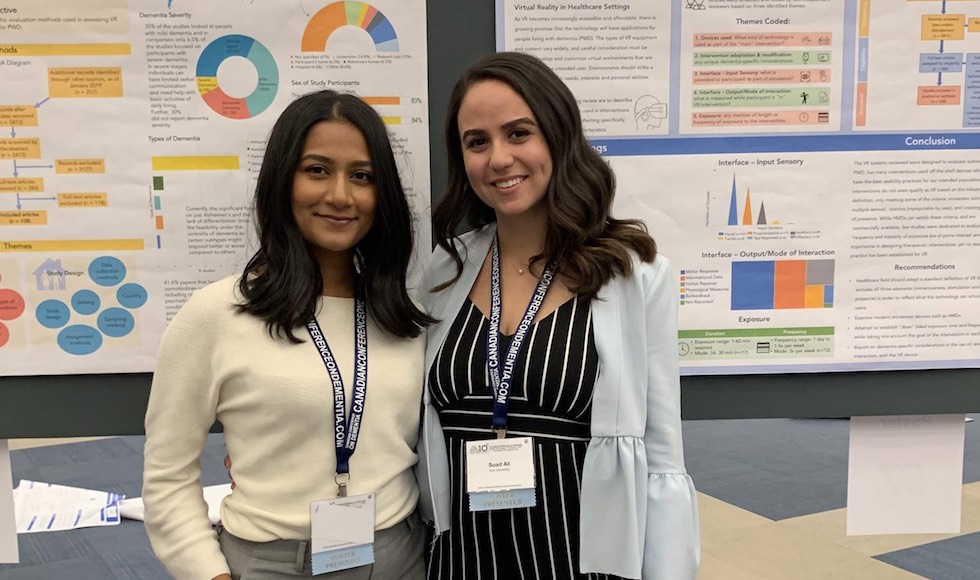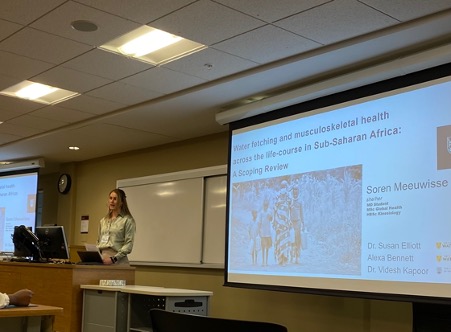Students’ research explores the promise of Virtual Reality for patients with dementia

Virtual Reality (VR) offers new hope for people living with dementia (PWD) – and Master of Science in Global Health students Suad Ali and Tanya Narang are investigating the role these technologies could play in combating this growing global health problem. Ultimately, Ali and Narang hope their research will help to inform the use of VR as a way to reduce the need for pharmacological interventions for patients with dementia.
VR is already being used in many health care settings, from psychiatric care to surgery and pain reduction treatments. And as the technology becomes more accessible and affordable, there is growing promise that VR will have applications for PWD.
“Each year, there are more than 7 million new cases of dementia – that’s one every three seconds,” explains Ali. “Virtual reality shows promise as a way of tackling the issue, but there’s a gap in terms of the protocol and guidelines when VR is used among the dementia population,” she says.
Ali and Narang recently presented research abstracts at the 10th Canadian Conference on Dementia. Their findings so far have revealed that careful consideration must be given to develop and customize virtual environments that are optimized for the intended users – and that while frequency and intensity of exposure to VR are of prime importance in designing therapeutic interventions, no standard practice has been established for VR. They also found that few VR head-mounted-displays, which are commercially available and afford the unique quality of presence, have been incorporated in interventions various settings, including hospitals and residential homes.
Overall, Ali and Narang recommend that future research should examine modern immersive devices, attempt to establish an ideal exposure time and frequency, and report on dementia-specific considerations in the use of, and interaction with, the VR device.
Narang’s research is focused specifically on describing the current research landscape on the use of virtual reality technologies as therapeutic measures for people with dementia, while Ali has been exploring the benefits of using VR among people with dementia in an acute hospital setting.
“We’re very interested in the push towards the inclusion of non-pharmaceutical interventions for people with dementia, including the use of technology to reduce barriers in conducting activities of daily living,” says Narang. “Virtual reality has the potential to provide therapeutic effects for patients and caregivers,” she adds.
Ali and Narang are hopeful about the future and the work being done across Canada using technology for dementia care. At the same time, they recognize the need for better public awareness about the condition in general and its increasing threat to global health. “Dementia needs to be seen as a public health priority – so it’s reassuring in this age of technology that scholars are looking into ways to enhance quality of life using everything that’s available to us,” says Ali.
Student and Alumni Profiles
Related News
News Listing

A Journey from Research to Advocacy: Global Health Alumna’s Impact on Health Equity
Student and Alumni Profiles
October 17, 2024

“My work does not only come from a place of intellectual curiosity, but also shared grief”: Dr. Zoha Salam’s Journey as the Second Global Health Doctoral Program Graduate
Global Health News, Student and Alumni Profiles
June 20, 2024

PhD Student Tackling Intimate Partner Violence in Resource-Constrained Settings Receives an IDRC Doctoral Research Award
Student and Alumni Profiles
February 28, 2024
